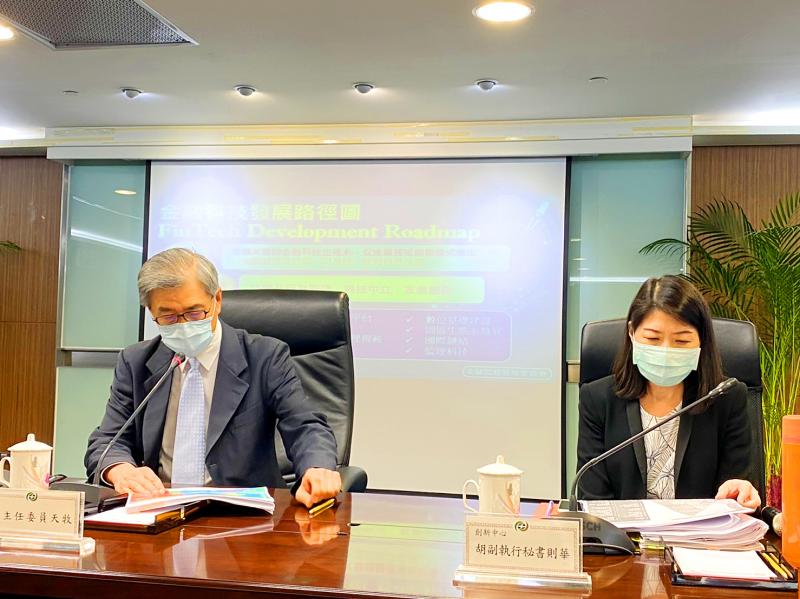The Financial Supervisory Commission (FSC) on Thursday unveiled its fintech development roadmap for the coming three years, relaxing its regulations on consumer data sharing and corporate account opening while introducing a new fintech license.
From next year, financial holding companies’ subsidiaries would be allowed to share consumer data with one another if they have obtained their customers’ consent, Department of Planning Deputy Director Brenda Hu (胡則華) told a news conference in New Taipei City.
This would help companies in assessing risks in doing business with new clients, Hu added.

Photo: Kao Shih-ching, Taipei Times
It would also enable financial holding companies to build bigger databases and risk assessment models for common use by its subsidiaries, which would be more effective and cost-saving than having individual units set up their own databases and models, Hu added.
For example, Cathay Financial Holding Co (國泰金控) could set up a consumer database for its units, such as Cathay Life Insurance Co (國泰人壽) and Cathay United Bank (國泰世華銀行), so the subsidiaries could know their customers better, the commission said.
“However, companies should share consumer data to a reasonable degree and the FSC would implement a new mechanism to ensure that they only share data for the purpose of risk management and not marketing,” Hu said.
While consumer data sharing marks a milestone in the nation’s move into open banking, the commission would leverage the UK’s Financial Conduct Authority experience in promoting such a practice to avoid bad outcomes, such as improper use of consumer data or customer discrimination, the commission said.
The FSC would consider broadening the scope of consumer data sharing to non-affiliated financial firms, such as start-up fintech companies in 2022 or to non-financial companies, such as telecoms and electronic commerce firms, in 2022 or 2023, it said.
Meanwhile, as more businesses are establishing a presence online amid the COVID-19 outbreak, the commission is considering allowing more types of companies to open online corporate bank accounts by 2022.
Currently the commission only allows sole proprietorships or single-shareholder companies to open online corporate accounts to prevent potential disputes.
The commission is considering expanding the measure to include companies with three shareholders or fewer, Banking Bureau Deputy Director-General Lin Chih-chi (林志吉) said.
While the use of corporate seals might seem an unusual custom in many foreign countries, it is still popular in Taiwan and some Asian countries, but if more companies are allowed to open online accounts, they might become redundant, Lin said.
The commission would study the issue further and would relax its regulations on corporate online accounts by phases, Lin said.
Given a lack of fintech talent in Taiwan, the commission would introduce a new fintech license by 2022, rewarding companies that have more licensed fintech staff by prioritizing their applications to conduct fintech businesses, Hu said.
“Some talent in the technology field are interested in changing careers and transferring to the financial industry, but they do not know how to do that. If they pass the exam and obtain a license, it could be their ticket” to the finance industry, Hu said.
What topics should be included in the fintech license exam has not been finalized, she added.

SEEKING CLARITY: Washington should not adopt measures that create uncertainties for ‘existing semiconductor investments,’ TSMC said referring to its US$165 billion in the US Taiwan Semiconductor Manufacturing Co (TSMC, 台積電) told the US that any future tariffs on Taiwanese semiconductors could reduce demand for chips and derail its pledge to increase its investment in Arizona. “New import restrictions could jeopardize current US leadership in the competitive technology industry and create uncertainties for many committed semiconductor capital projects in the US, including TSMC Arizona’s significant investment plan in Phoenix,” the chipmaker wrote in a letter to the US Department of Commerce. TSMC issued the warning in response to a solicitation for comments by the department on a possible tariff on semiconductor imports by US President Donald Trump’s

The government has launched a three-pronged strategy to attract local and international talent, aiming to position Taiwan as a new global hub following Nvidia Corp’s announcement that it has chosen Taipei as the site of its Taiwan headquarters. Nvidia cofounder and CEO Jensen Huang (黃仁勳) on Monday last week announced during his keynote speech at the Computex trade show in Taipei that the Nvidia Constellation, the company’s planned Taiwan headquarters, would be located in the Beitou-Shilin Technology Park (北投士林科技園區) in Taipei. Huang’s decision to establish a base in Taiwan is “primarily due to Taiwan’s talent pool and its strength in the semiconductor

An earnings report from semiconductor giant and artificial intelligence (AI) bellwether Nvidia Corp takes center stage for Wall Street this week, as stocks hit a speed bump of worries over US federal deficits driving up Treasury yields. US equities pulled back last week after a torrid rally, as investors turned their attention to tax and spending legislation poised to swell the US government’s US$36 trillion in debt. Long-dated US Treasury yields rose amid the fiscal worries, with the 30-year yield topping 5 percent and hitting its highest level since late 2023. Stocks were dealt another blow on Friday when US President Donald

UNCERTAINTY: Investors remain worried that trade negotiations with Washington could go poorly, given Trump’s inconsistency on tariffs in his second term, experts said The consumer confidence index this month fell for a ninth consecutive month to its lowest level in 13 months, as global trade uncertainties and tariff risks cloud Taiwan’s economic outlook, a survey released yesterday by National Central University found. The biggest decline came from the timing for stock investments, which plunged 11.82 points to 26.82, underscoring bleak investor confidence, it said. “Although the TAIEX reclaimed the 21,000-point mark after the US and China agreed to bury the hatchet for 90 days, investors remain worried that the situation would turn sour later,” said Dachrahn Wu (吳大任), director of the university’s Research Center for